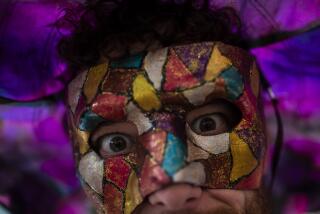Ratings Soar for Brazilian Soap Opera : Television: Six-night-a-week show on the nation’s largest network, TV Globo, won record ratings during its five months on the air.
- Share via
RIO DE JANEIRO — Spirits are rising in Brazil. Or at least their TV ratings are.
A blockbuster soap opera about reincarnation has brought the occult out of Brazil’s closet. And its success suggests that the world’s largest Roman Catholic country may be not so Catholic after all.
“The Journey,” a prime-time, six-night-a-week soap on Brazil’s largest network, TV Globo, won record ratings during its five months on the air.
The final chapter in October was seen by more than 70 million people from the Amazon to the southern pampas, a whopping 90% of the people watching TV that night.
Viewers were eager to learn the fate of Alexandre, a young hoodlum who kills himself in prison. It is after his suicide that things really get interesting.
Alexandre’s spirit “wakes up” in the Valley of the Suicides, a nightmarish place of fire, mud and wailing souls. He shuttles back and forth to the land of the living to seek vengeance on his earthly enemies.
Later, Alexandre’s sister, Dina, has a heart attack and joins him in the beyond. At first reluctant to accept her own death, Dina eventually tries to transform Alexandre into a “spirit of light” and release him from his purgatory.
In a happy ending, Alexandre joins the angelic community of evolving spirits and reincarnates as his brother’s baby son.
The Catholic Church reacted sharply. In a commentary for the Rio newspaper Jornal do Brasil, Bishop Boaventura Kloppenburg condemned the doctrinal deviation in “The Journey.”
“At least the TV series gave viewers a vision of an after-world. That’s OK,” Kloppenburg said in a telephone interview from his diocese in the southern city of Novo Hamburgo. “What’s not OK is reincarnation. Church doctrine is specific in saying that human beings have only one life on earth.”
But the occult has a strong pull in this country of 160 million people. Catholicism has long coexisted or competed with African spirit religions, witchcraft and European spiritualism, and now with fast-growing fundamentalist Protestant groups.
In a 1990 survey, about 85% of Brazilians said they were Catholics. But that figure is highly misleading, said Andre Luis de Mello, a researcher at the Religion Studies Institute in Rio de Janeiro.
Catholic church attendance has fallen steadily in recent years, Mello said. Meanwhile, spirit cults and fundamentalist Christian churches are growing.
What is happening is a backlash to centuries of syncretism, or religious fusion, Mello said.
In colonial times, native Indians and African slaves were not allowed to practice their own religions. So they “disguised” their deities as white Catholic saints and feigned true conversion.
But when their masters went to bed, slaves would beat drums and chant in their Yoruba tongue invocations to the pantheon of African gods and goddesses.
Today, millions of Brazilians of all races openly practice African candomble or its offshoot umbanda, which incorporates elements of European spiritualism that took root in Brazil in the 19th Century.
The “pope” of spiritualism was French educator Allan Kardec. His 1857 book “The Book of Spirits” became a cult best seller in Brazil and the basis of a new religion.
Kardec believed in reincarnation and atonement in a later life for one’s actions and sins. Death was simply a gateway, and spirits could come back and contact this world through mediums, he said.
Some estimates say there are more than 10 million “Kardecistas” in Brazil.
Mello said that does not include part-time spiritualists. “Many people who identify themselves as Catholics go to Kardecist temples when they need to communicate with the supernatural,” he said.
“The Journey,” which is based on Kardec’s doctrine, sparked a boom in attendance at spirit temples and in the sale of books on the occult.
The top-selling author is Chico Xavier, who is credited with writing more than 380 books. Xavier, 74, claims he simply puts on paper the words dictated by spirits. He was a consultant for “The Journey.”
The evangelist rituals appeal to the poor with easy-to-understand language and high theatrics, often including on-the-spot exorcisms.
More to Read
Sign up for Essential California
The most important California stories and recommendations in your inbox every morning.
You may occasionally receive promotional content from the Los Angeles Times.













